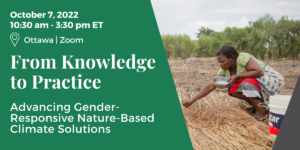Gender-Responsive Nature-Based Climate Solutions Build Resilience Across Diverse Social and Ecological Landscapes
Nature-based climate solutions (NBCS) can contribute to conserving and restoring biodiversity and ecosystems while providing an opportunity for people to realize rights, sustainably use ecosystems on which they depend, and build their resilience to climate and related crises. Yet for this to hold true across communities, it is crucial to adopt inclusive, gender-responsive approaches to NBCS initiatives.
From Knowledge to Practice: Building Capacity for Gender-Responsive NBCS
On October 7, 2022, Aga Khan Foundation Canada (AKFC) and the International Institute for Sustainable Development (IISD) co-hosted From Knowledge to Practice: Advancing Gender-Responsive Nature-Based Climate Solutions, a capacity-building session on promoting gender equality through rights-based, inclusive approaches to NBCS. The session featured case studies and breakout discussions with experienced practitioners including:
- Humaira Daniel, Climate Resilience Specialist, Aga Khan Foundation Afghanistan
Watch her presentation: Success, Challenges and Opportunities in Achieving Gender Inclusive Climate Resilience in Afghanistan - Angie Dazé, Lead, Gender Equality and Social Inclusion, IISD
Watch her presentation: Gender-Responsive Action for Climate-Resilient Water Resource Management in Suriname - Gena Gammie, Director, Water Initiative, Forest Trends
Watch her presentation: Natural Infrastructure for Water Security in Peru
The session was followed by a community of practice meeting focusing on NBCS and biodiversity, led by Global Affairs Canada (GAC). Both sessions welcomed virtual and in-person participants at the Delegation of the Ismaili Imamat in Ottawa.
Opening the session, Steve Mason, AKF Regional Director of Programs (North America), set the tone for the session by emphasizing that while NBCS hold significant promise in helping people mitigate and adapt to the adverse impacts of climate change, the sustainability and beneficial outcomes of these solutions require an inclusive approach that fully accounts for the rights and needs of diverse populations – especially women, who too often bear the brunt of the adverse impacts of climate change. While underscoring that NBCS remain underfunded globally, Steve recognized the shared interest of organizations in Canada to advance NBCS and the opportunity granted as a result of Government of Canada funding to deliver on climate, biodiversity, and social objectives through NBCS.
Partnering for Climate
Highlighting a key funding opportunity, Global Affairs Canada (GAC) provided an overview of its Partnering for Climate initiative. This includes $300 million for organizations in Canada to support NBCS in Sub-Saharan Africa, with an interest in projects that support women’s leadership and decision making in climate solutions, resilience building, and sustainable natural resource management. In addition, the initiative includes $15 million for Indigenous-led climate solutions that are designed and led by Indigenous organizations in Canada in collaboration with Indigenous organizations in the Global South. The availability of this funding reiterates the need to strengthen capacity among organizations in Canada to support effective NBCS that deliver biodiversity and social co-benefits.
Capacity to Deliver on Gender-Responsive NBCS
With an interest in strengthening capacity for NBCS, Veronica Lo, Senior Policy Advisor with IISD’s Resilience program, outlined a self-paced e-learning course on ecosystem-based adaptation (EbA) offered through IISD’s Nature for Climate Adaptation Initiative (NCAI). In addition to offering detailed guidance on EbA, the course considers insights into cross-cutting issues such as gender-responsive approaches, inclusive governance, and honouring Indigenous knowledge. Anya Knechtel reviewed the potential impact of approaches ranging from gender-discriminatory to gender-transformative, recognizing that supporting intersectional, action-oriented, and rights-based approaches that are either gender-responsive or -transformative, help to ensure equitable participation in, and benefits from, NBCS initiatives.
Tailoring NBCS to Local Contexts
The three case studies addressed a spectrum of political and social contexts in which NBCS initiatives are being undertaken.
Humaira Daniels, AKF Afghanistan Climate Resilience Specialist, discussed AKF’s ongoing nature-based climate initiatives in Afghanistan. Given the changing political context, AKF’s activities have shifted from being strongly engaged with government-led climate initiatives to operating in relative isolation on a project-by-project basis. Restrictions on women’s participation, land tenure, mobility, and other areas also present major hurdles to gender-inclusive approaches. Yet by working with local women’s groups, AKF has been able to assess and prioritize women’s needs, and identify opportunities, such as greenhouses and tree nurseries, that enable women to safely participate while supporting their social empowerment and access to sustainable livelihoods.
Daniels emphasized, “We still have opportunities and future outlook for achieving gender responsive climate resilience… There are opportunities to improve their skills; women can attend training sessions which are led by women. Women are willing to work with organizations and NGOs with proper hijab and separate offices. Involving men in supporting women and family for better implementation is another strategy which we are working in and hopefully this will enable women to work freely.”
AKF’s efforts in Afghanistan demonstrate how gender-responsive climate actions can contribute to building resilience, even when occurring in isolation of national and international climate strategies.
In contrast, Gena Gammie, Director of Forest Trends’ Water Initiative in Peru, noted how the Peruvian government’s commitment to incorporating gender considerations into its national climate programming is helping to facilitate opportunities to elevate women’s leadership roles in the management of nature-based water infrastructure. Yet even with supportive policies, women’s participation in decisions related to water resources remains below 30%.
Speaking to the challenge of inclusion, Gammie said, “We need to recognize the structural challenges that are preventing active and full participation of women, and decision making on water management including how rights are assigned for land tenure and water resources, the share of domestic work, time, poverty and pay equity, formal education gaps, and gender based-violence.”
By undertaking inclusive planning processes, Forest Trends was also able to engage women in decisions, including those aimed at identifying and addressing related issues, such as food security, that resulted in the project delivering greater social and economic co-benefits. Key to this initiative was the emphasis on incorporating Indigenous knowledge, and working in partnership with government and utilities to support effective management strategies that are helping to safeguard water supplies and increase climate resilience.
Angie Dazé, IISD’s Gender Equality and Social Inclusion Lead, outlined Suriname’s path from developing a gender-sensitive National Adaptation Plan (NAP) to realizing a gender-responsive, action-oriented water resources sector strategy that included goals such as securing sufficient drinking water. While the NAP identified higher-level objectives, including reducing social and gender inequities through adaptation initiatives, it did not provide details on how these objectives will be achieved.
The NAP Global Network supported the government in developing a gender-responsive, sector-specific strategy “grounded in vulnerability and risk assessments for water resources and… a commitment to incorporate local knowledge and a participatory approach.” Dazé emphasized the importance of locally contextualized responses that identify and address the specific needs of local communities, and the need for gender-disaggregated data to support NBCS initiatives.
Participants had the opportunity to delve further into the case studies and discuss strategies and challenges arising from their organizations’ nature-based initiatives. The session helped participants to gain insights into gender-responsive NBCS, and network with other practitioners seeking to address biodiversity loss and build climate resilience across diverse communities.
Watch the full recording:
From Knowledge to Practice: Advancing Gender-Responsive Nature-Based Climate Solutions was the third event in the AKFC’s speaker series on climate change resilience and adaptation. The series aims to bring together practitioners, advocates, and others who share an interest in exploring and discussing how we may use the climate crisis as a catalyst for great leaps in addressing the complex challenges involved in confronting climate change in a manner that advances sustainable development, well-being, and resilient livelihoods for all.
Sign up for AKFC’s monthly newsletter and check our events page regularly for information on upcoming events in our climate series and other programs.


